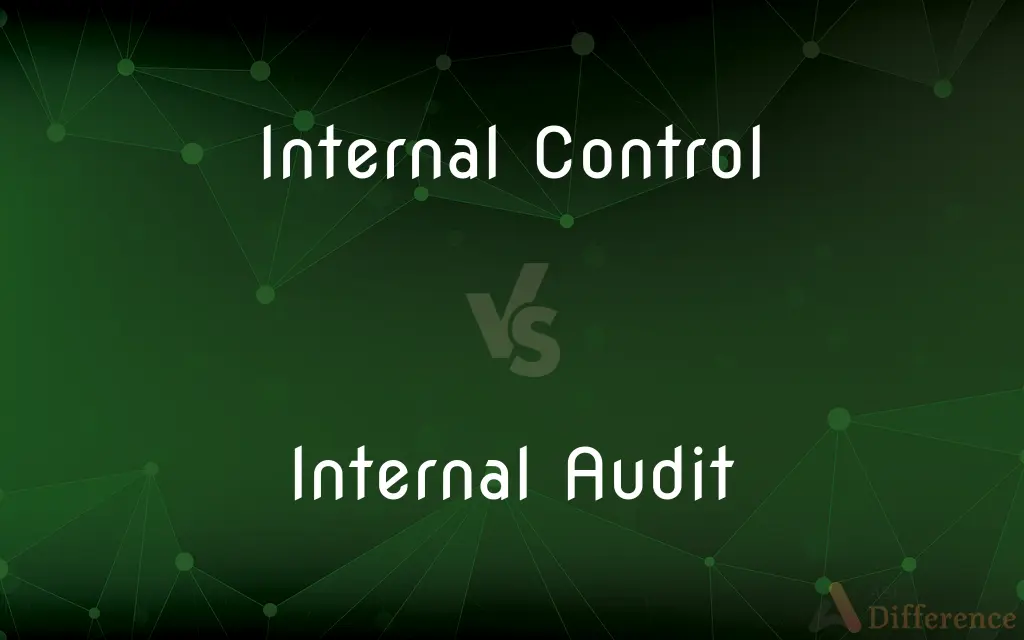Internal Control vs. Internal Audit — What's the Difference?
By Tayyaba Rehman — Published on November 11, 2023
Internal Control is the systematic process to manage risks and achieve objectives. Internal Audit is the evaluation of internal controls to ensure effectiveness and compliance.

Difference Between Internal Control and Internal Audit
Table of Contents
ADVERTISEMENT
Key Differences
Internal Control represents processes and procedures implemented by a company to ensure the reliability of financial reporting, operational effectiveness, and compliance with relevant laws and policies. In comparison, Internal Audit signifies a function that evaluates, monitors, and enhances the effectiveness of internal control systems. While Internal Control is about designing and implementing control mechanisms, Internal Audit scrutinizes these mechanisms to ensure they are functioning as intended.
Internal Control consists of ongoing measures, such as segregation of duties, authorization protocols, and regular reconciliations, designed to deter and detect discrepancies, errors, and fraud. Conversely, Internal Audit acts as an independent body within the organization, reviewing and analyzing the efficacy of Internal Control systems in managing risks and ensuring that the company's operations are carried out effectively and responsibly.
The focus of Internal Control encompasses everyday processes and procedures that guide the conduct and decision-making of employees and management. Contrarily, Internal Audit takes on a more overarching approach, ensuring that the Internal Controls in place align with the company's objectives and are adhering to external regulations and internal policies. Hence, while Internal Control provides a framework for operation, Internal Audit evaluates the soundness and effectiveness of this framework.
The purpose of Internal Control is multifaceted, ensuring accurate financial reporting, safeguarding assets, and enhancing operational efficiency by reducing risks of error and fraud. In contrast, Internal Audit aims to add value and improve an organization's operations through systematic, disciplined approaches to evaluate and improve the effectiveness of risk management, control, and governance processes.
In terms of implementation, Internal Control systems are embedded within an organization’s activities, forming an intrinsic part of its various processes. On the other hand, Internal Audit typically operates as an independent unit, objectively assessing the Internal Controls, providing assurance, and advising the organization on how to improve its efficacy.
ADVERTISEMENT
Comparison Chart
Primary Purpose
Implementing processes to manage risks
Evaluating the effectiveness of controls
Frequency
Continuous, embedded in operations
Periodic, scheduled assessments
Focus
Developing and maintaining controls
Assessing and improving controls
Independence
Integrated into management
Independent of management
Accountability
Accountable to management
Accountable to audit committee/board
Compare with Definitions
Internal Control
Internal Control entails mechanisms that enhance operational efficiency and adherence to regulations.
Through robust Internal Control, the company successfully adhered to regulatory compliance.
Internal Audit
Internal Audit is tasked with assuring the reliability and effectiveness of internal control and governance.
The CEO emphasized that a rigorous Internal Audit ensured the reliability of the company's financial statements.
Internal Control
Internal Control is a continuous undertaking to mitigate operational risks and ensure objective alignment.
The company utilized Internal Control to curtail risks associated with financial discrepancies.
Internal Audit
Internal Audit involves scrutinizing and assessing a company's internal control systems and policies.
The Internal Audit team uncovered discrepancies in the financial reports during their review.
Internal Control
It's a systematic effort to regulate organizational operations to ensure consistency and reliability.
The CFO implemented strict Internal Control to ensure consistent financial reporting.
Internal Audit
Internal Audit provides assurance on the company's risk management, control, and governance processes.
Through Internal Audit, management received assurance regarding the robustness of their control mechanisms.
Internal Control
It involves procedural steps taken by an entity to safeguard against fraud and errors.
Internal Control systems detected financial inconsistencies, saving the company from potential fraud.
Internal Audit
It entails objective analysis and assessment of organizational processes to improve effectiveness.
The Internal Audit revealed weaknesses in the procurement process, recommending enhancements.
Internal Control
Internal Control constitutes policies designed to safeguard assets and enhance reliability of financial statements.
Internal Control mechanisms were enforced to prevent asset misappropriation.
Internal Audit
It's a function designed to independently evaluate the efficacy of internal controls and risk management.
After an extensive Internal Audit, several areas for improvement in risk management were identified.
Common Curiosities
What is the main goal of an Internal Audit?
Internal Audit aims to objectively evaluate and improve the organization’s internal control, risk management, and governance processes.
To whom does the Internal Audit team typically report?
The Internal Audit team generally reports to the Audit Committee or the Board of Directors to maintain its independence from management.
Is Internal Audit mandatory for organizations?
While it depends on jurisdiction and company size, in many cases, Internal Audit is either mandatory, especially for publicly traded companies, or considered best practice for safeguarding organizational integrity.
Are Internal Control systems standardized across organizations?
While frameworks like COSO are widely accepted, Internal Control systems may be designed differently across organizations to address specific operational nuances and risks.
What is a control environment in the context of Internal Control?
The control environment, a component of Internal Control, refers to the organizational culture, structure, and discipline which influence the quality and functioning of internal controls.
What is the primary function of Internal Control?
Internal Control works to manage risks and ensure that the organization achieves its objectives efficiently and accurately.
How does Internal Control help in achieving organizational objectives?
Internal Control helps by ensuring the reliability of financial reporting, safeguarding assets, and promoting operational efficiency and adherence to laws and regulations.
Can Internal Control prevent all errors and fraud within an organization?
While robust Internal Control can significantly mitigate the risk of errors and fraud, it cannot guarantee absolute prevention due to factors like collusion or management override.
How does technology impact Internal Control processes?
Technology influences Internal Control by enabling automated controls, enhancing data accuracy, and facilitating efficient transaction processing and reporting.
How does Internal Audit ensure its independence while operating within the organization?
Internal Audit maintains independence by reporting findings directly to high governance bodies like the board or audit committee, and not being involved in the day-to-day activities of the organization.
Who is typically responsible for implementing Internal Control within an organization?
Management is usually responsible for designing, implementing, and maintaining effective Internal Control within the organization.
What qualifications are generally required for an Internal Auditor?
Internal Auditors typically have qualifications in accounting or finance, such as CIA (Certified Internal Auditor) or CPA (Certified Public Accountant).
How does Internal Audit select areas or processes to audit within an organization?
Internal Audit often utilizes a risk-based approach, prioritizing areas or processes that are perceived to be of higher risk or significance to the organization.
Can Internal Control and Internal Audit functions be outsourced?
Yes, organizations can outsource Internal Control and Internal Audit functions, but it's crucial to ensure that the service providers act independently and adhere to relevant standards and regulations.
What role does Internal Audit play in corporate governance?
Internal Audit enhances corporate governance by providing independent assurance on risk management and internal control effectiveness to stakeholders and the board.
Share Your Discovery

Previous Comparison
Ex-Showroom Price vs. On-Road Price
Next Comparison
Protein Kinase A vs. Protein Kinase CAuthor Spotlight
Written by
Tayyaba RehmanTayyaba Rehman is a distinguished writer, currently serving as a primary contributor to askdifference.com. As a researcher in semantics and etymology, Tayyaba's passion for the complexity of languages and their distinctions has found a perfect home on the platform. Tayyaba delves into the intricacies of language, distinguishing between commonly confused words and phrases, thereby providing clarity for readers worldwide.












































